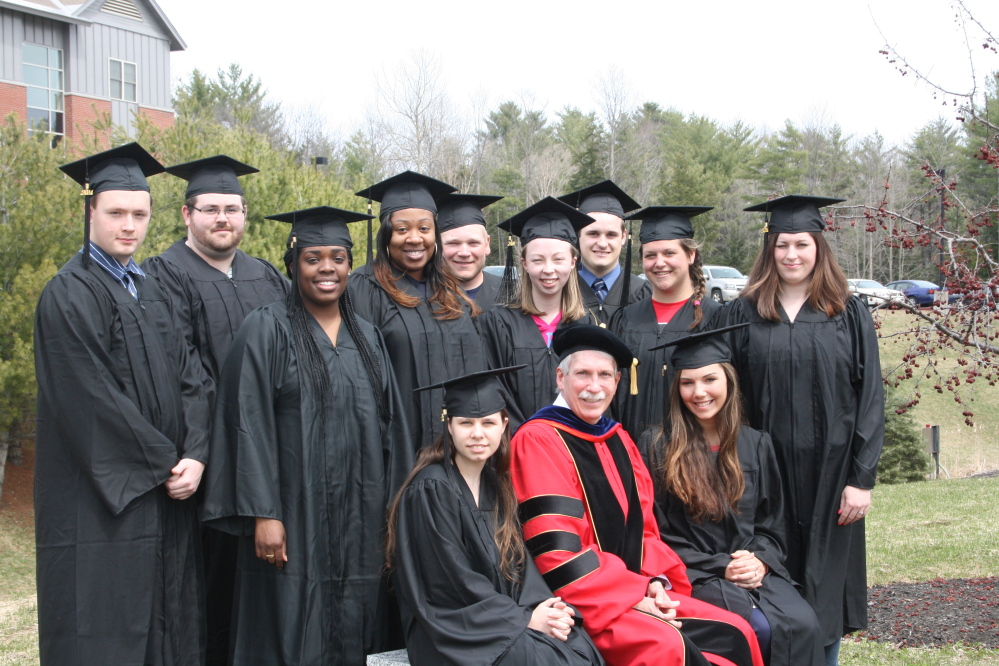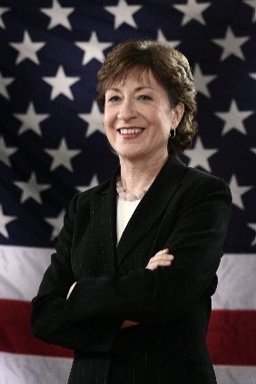When U.S. Sen. Susan Collins addresses the graduating class of Thomas College as commencement speaker May 10, it will be a day of firsts.
It is the first time such a large class — 198 students — has graduated from the growing college.
It is the first time graduating students have been helped by the college’s innovative retention program — Engage, Develop, Guide, Empower, known to most of them as EDGE.
And for those 11 students, the survivors of an initial pool of 23 who enrolled in the program four years ago, it is the first time anyone in their families has attained a college degree.
Collins is “an effective and tireless advocate for Maine families,” according to a news release announcing her as the speaker.
That is right in line with the EDGE program’s mission.
When Debbie Cunningham became the college’s dean of retention services in 2007, it was up to her to make sure that the year’s incoming freshmen walked off the graduation ceremony stage four years later with diplomas.
But Cunningham was facing a problem that is familiar to retention administrators across the country. Even after a student applied to Thomas and was accepted, if a student’s parents hadn’t gone to college, the odds were 2-to-1 against the student graduating in four years, if ever.
Those students were also more likely to have major health problems, more likely to be forced to take a semester off because of financial problems and more likely to have to work more hours while attending school.
Cunningham said one common scenario is for a student to arrive on campus having just scraped together a semester’s tuition, about $11,000, but not being able to afford textbooks — at least not right away.
Instructors are willing to work with students, Cunningham said, but many students don’t know that or don’t want to deal with the embarrassment of not being able to afford a book.
So the student would fall behind in the first couple of weeks or not show up to class at all until the money to buy that textbook came through.
The result is a worse start, a worse chance of passing the class and, ultimately, a worse chance at graduation.
Other students were not well prepared for a college classroom by their high schools or just don’t have the comfort level and knowledge needed to navigate a college’s bureaucracy.
“Their confidence is lower than those whose parents have completed college,” Cunningham said. “Their parents might not say, ‘go see a faculty adviser; that’s what they’re there for.’”
Because of these issues, and many more like them, nearly half wouldn’t make it into their second year of college, and two-thirds wouldn’t make it to graduation in four years.
SOLVING THE PROBLEM
Cunningham wanted to help first-generation college students succeed, and she had a good idea of how to do it. She came to Thomas College from Adams State University, a Colorado college, where she had seen a federally funded retention program with proven results.
The principles for improving retention are simple.
During their first year, students in EDGE come to Thomas a week early, when they are given additional instruction and get a chance to feel out the rhythm of college life before they are lost in a crowd of more experienced or better prepared students.
The program also pays for those students’ textbooks, about $500 per student, and provides them with peer tutors, high-achieving students on campus who are paid to sit through those early classes and help the first-generation students do well.
But knowing how to retain at-risk students and actually having the resources to do so are two different things. Cunningham said it was hard for her to get funding for the program, which had not been proved at Thomas.
In 2011, her chance came when she got a grant from the Council of Independent College’s Walmart College Success Awards, which funds pilot programs designed to help retain first-generation students.
The grant paid for 23 students, at a cost of about $2,000 per student. If the program showed promise, the grant would pay for a second year, and then leave Thomas College with the decision of whether it was worthwhile to continue to invest in.
The results were so dramatic in the first year that Thomas College paid to expand it to help 43 students in the second year.
Within the program’s first crop of EDGE students, 78 percent of them showed up for their second year of instruction, a huge improvement over the 57 percent return rate of first-generation students who didn’t have access to the program.
And the EDGE students didn’t just show up; they showed up motivated to succeed and to help others succeed.
Several of them became peer tutors themselves, helping the second batch of EDGE students follow in their footsteps.
“When that happened,” Cunningham said, “I knew that the program was really having an impact.”
One student, Katie Brown, became a peer mentor after working her way through her first year in an entry-level position at Tim Hortons.
“If you’ve got the drive to wake up at 4 in the morning and make doughnuts at Tim Horton, that’s a lot of drive,” Cunningham said. “That’s a lot of will. That’s a Maine, can-do attitude.”
Once students such as Brown got over those first-year obstacles, the benefits of the program continued into their junior and senior years.
This month, Brown and 10 other students from that first batch of 23 are graduating on time, with a few others hopeful that they will graduate next year. By contrast, only 36 percent of the first-generation students who did not have EDGE in their first year will graduate this year.
“I did not in my wildest imaginations think we would have this kind of impact at the four-year mark,” Cunningham said.
Now EDGE is such a proven success that Thomas funds it at a level that allows it to support 75 students each year.
LARGEST GROUP
The college’s 120th commencement ceremony, which will take place May 9 and 10, will mark a new level of success in educating students, with an all-time-high of 198 graduating students.
The first ceremony Cunningham was on hand for, in 2008, had 145 graduating students.
When the college announced Collins as its commencement speaker Tuesday, it was a departure from the typical set of business leaders and board of trustee members who fill the role.
Gov. Paul LePage was the speaker in 2012; others in recent years have been Cianbro president Peter Vigue, retired TD Bank board chairman William Ryan, landscape and garden design leader Julie Moir Messervy, former Sheridan Corp. president Douglas Cutchin and former PFG-NorthCenter Food Service Corp. owner H Allen Ryan.
Collins has represented Maine in the Senate since 1996.
She’s “known for her work in facilitating bipartisan compromise,” according to the news release.
“Her record demonstrates significant legislative accomplishments in such critical areas as homeland security, national defense, disaster response, education, business development, and health care.
“Susan Collins is not only an effective and tireless advocate for Maine families, she is a proven leader who is respected by colleagues on both sides of the aisle,” the release states. “She is also recognized as one of the hardest working members of Congress.”
Scarlett Stevens, of Bradford, a student graduating with a criminal justice degree, will speak on behalf of the undergraduate class; while Javier Abascal Carrasco, of Seville, Spain, will speak on behalf of the graduate students as he receives a master’s degree in business administration.
This year’s class marshals are Tiffany Beaulieu, an early childhood education major from Jefferson, and Jeffrey Berard, a criminal justice major from Lebanon.
Dorcas Riley, the vice president of finance at Day’s Jewelers in Waterville, will speak at the Honors Convocation in the Laurette Ayotte Auditorium.
Cunningham said the college is continuing to look for innovative ways to move more students through the system as efficiently as possible.
“This year, we’re rolling out our three-year bachelor’s degree,” she said. “If high-achieving students want to get into the workforce earlier and are willing to put in the work, they can do that. And if they want, they can add a fourth year for an MBA.”
Matt Hongoltz-Hetling — 861-9287 mhhetling@centralmaine.com Twitter: @hh_matt
Send questions/comments to the editors.




Success. Please wait for the page to reload. If the page does not reload within 5 seconds, please refresh the page.
Enter your email and password to access comments.
Hi, to comment on stories you must . This profile is in addition to your subscription and website login.
Already have a commenting profile? .
Invalid username/password.
Please check your email to confirm and complete your registration.
Only subscribers are eligible to post comments. Please subscribe or login first for digital access. Here’s why.
Use the form below to reset your password. When you've submitted your account email, we will send an email with a reset code.